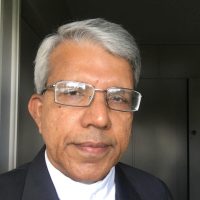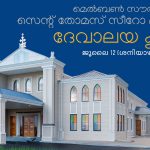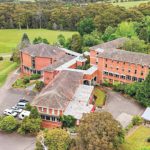
On 20th November 2016, the Feast of Christ the King, the day of Conclusion of the Year of Mercy, by the decree given by Bishop Bosco Puthoor from the Chancery of the Eparchy of Melbourne, St Euphrasia Syro-Malabar Parish was established. Our patroness is St Euphrasia (Evuprassiamma) and ours is the First Parish to be established in her name. Our Co-Patron is St. Anthony of Padua.
In 2012, Syro-Malabar community in Adelaide received Rev Fr Francis Perumadan ofm Cap as its resident temporary chaplain. In 2013, Fr Frederick Eluvathingal was appointed as the first chaplain for this community. From the humble beginnings, a decade ago with a few occasional family congregations we progressed to become the first Syro-Malabar parish in South Australia. Rev. Fr. Biju John Chulayillaplackal became the first Vicar of the new Parish. On September 1, 2018, Fr. Francis Pullukattu took over as our parish priest, and during his tenure, the new church was consecrated on October 31, 2019. In 2021, Fr. Ajith Cheriakkara Antony became our parish priest, and currently, we are served by Fr. Abraham Kazhunnadiyil. Our parish stands out among similar Syro-Malabar parishes in the Diocese for the Christian Love among the parish families. We consider each other as members of their extended family. Let us pray that this sense of love, fellowship and sharing continue in our parish as we grow together and go further in our journey of faith.

Fr Abraham Kazhunadyil
Email: office.northadelaide@syromalabar.org.au
PH: 0401 180 633
Website: https://euphrasiaparish.org
Holy Qurbana Timing & Address:
St. Euphrasia SyroMalabar Church
5 Wiley Street
Elizabeth South, SA- 5112
Sun: 5.30pm – Holy Qurbana
4.30pm – Catechism
Tue: 6.00 pm – Holy Qurbana and St. Antony’s Novena
Thu: 6.00 pm – Holy Qurbana
Fri: 6.00 pm – Holy Qurbana and St. Euphrasia’s Novena
7.00pm – Adoration
Sat: 6.00 pm – Holy Qurbana
Parish Contact Persons:
Trustees: Robin Joseph – +61 452 183 767
Jose Thomas- +61 469 718 831
Parish Secretary- Ashly Chemparathy- +61 421 409 134




